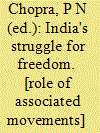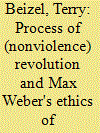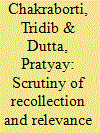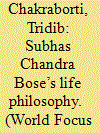| Srl | Item |
| 1 |
ID:
131911


|
|
|
|
|
| Edition |
1st ed.
|
| Publication |
DelhI, Agam Prakashan, 1985.
|
| Description |
193p.hbk
|
| Contents |
Vol-1
Rs. 600/ per set.
|
|
|
|
|
|
|
|
|
|
|
|
Copies: C:1/I:0,R:0,Q:0
Circulation
| Accession# | Call# | Current Location | Status | Policy | Location |
| 026660 | 954.03/CHO 026660 | Main | On Shelf | General | |
|
|
|
|
| 2 |
ID:
131015


|
|
|
|
|
| Publication |
2014.
|
| Summary/Abstract |
Weber dismissed paci?sm as an inadequate orientation to modern social and political life. However, the ethical and methodological imperative of Gandhi's insistence on active nonviolence contention is illuminated by and consistent with Max Weber's "ethic of responsibility"-marked by both passion and proportion-in the relationship between motivations, means, and ends in social action. Therefore, Weber's insights add clarity Gandhi's nonviolent ethics and methods; Gandhi's nonviolent ethics and methods add clarity to Weber's understanding of responsibility in modern political and social life. This provides a key to understanding active nonviolence and building the (peaceful) future in the process of revolution.
|
|
|
|
|
|
|
|
|
|
|
|
|
|
|
|
| 3 |
ID:
135445


|
|
|
|
|
| Summary/Abstract |
Acharya Narendra Deva was one of the founder figures of the Socialist Movement in India and he believed in the extreme nationalism as propagated by Aurobindo and Bal Gangadhar Tilak. In the realm of foreign policy, he felt the need to establish Scientific Socialism for the solution of India’s problems and considered the working class as the vanguard, the peasants and the intelligentsia as the auxiliary of an anti-imperialist struggle.
|
|
|
|
|
|
|
|
|
|
|
|
|
|
|
|
| 4 |
ID:
152598


|
|
|
|
|
| Summary/Abstract |
Subhas Chandra Bose remains a leading personality, who has symbolized himself as a leading/dominant freedom fighter, a true guide and a devoted friend of the Indian people and the world. As one of the chief architects of the Indian freedom movement, he awakened the country’s masses from the slavish siesta of self-degradation and stimulated their sense about its cultural, historical and national glory. During his entire life period, he enlightened the Indian masses about their feelings, self consciousness and duties for the country’s independence and mankind. The philosophical foundation of Subhas Chandra Bose’s political thought, as a person of humanity, was developed based on the influences of several personalities, several international freedom struggle events, impact of parents, various religions and his personal experience of life. This article will highlight the multiple facets, which made Subhas Chandra Bose a true humanist and freedom fighter in the pages of Indian history.
|
|
|
|
|
|
|
|
|
|
|
|
|
|
|
|